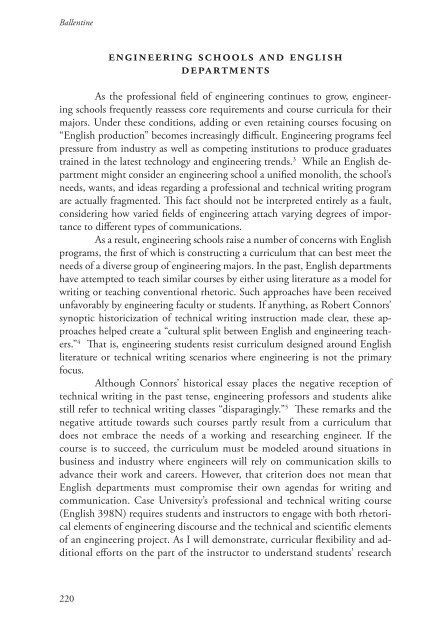Design Discourse - Composing and Revising Programs in Professional and Technical Writing, 2010a
Design Discourse - Composing and Revising Programs in Professional and Technical Writing, 2010a
Design Discourse - Composing and Revising Programs in Professional and Technical Writing, 2010a
You also want an ePaper? Increase the reach of your titles
YUMPU automatically turns print PDFs into web optimized ePapers that Google loves.
Ballent<strong>in</strong>e<br />
eng<strong>in</strong>eer<strong>in</strong>g schools <strong>and</strong> english<br />
departments<br />
As the professional field of eng<strong>in</strong>eer<strong>in</strong>g cont<strong>in</strong>ues to grow, eng<strong>in</strong>eer<strong>in</strong>g<br />
schools frequently reassess core requirements <strong>and</strong> course curricula for their<br />
majors. Under these conditions, add<strong>in</strong>g or even reta<strong>in</strong><strong>in</strong>g courses focus<strong>in</strong>g on<br />
“English production” becomes <strong>in</strong>creas<strong>in</strong>gly difficult. Eng<strong>in</strong>eer<strong>in</strong>g programs feel<br />
pressure from <strong>in</strong>dustry as well as compet<strong>in</strong>g <strong>in</strong>stitutions to produce graduates<br />
tra<strong>in</strong>ed <strong>in</strong> the latest technology <strong>and</strong> eng<strong>in</strong>eer<strong>in</strong>g trends. 3 While an English department<br />
might consider an eng<strong>in</strong>eer<strong>in</strong>g school a unified monolith, the school’s<br />
needs, wants, <strong>and</strong> ideas regard<strong>in</strong>g a professional <strong>and</strong> technical writ<strong>in</strong>g program<br />
are actually fragmented. This fact should not be <strong>in</strong>terpreted entirely as a fault,<br />
consider<strong>in</strong>g how varied fields of eng<strong>in</strong>eer<strong>in</strong>g attach vary<strong>in</strong>g degrees of importance<br />
to different types of communications.<br />
As a result, eng<strong>in</strong>eer<strong>in</strong>g schools raise a number of concerns with English<br />
programs, the first of which is construct<strong>in</strong>g a curriculum that can best meet the<br />
needs of a diverse group of eng<strong>in</strong>eer<strong>in</strong>g majors. In the past, English departments<br />
have attempted to teach similar courses by either us<strong>in</strong>g literature as a model for<br />
writ<strong>in</strong>g or teach<strong>in</strong>g conventional rhetoric. Such approaches have been received<br />
unfavorably by eng<strong>in</strong>eer<strong>in</strong>g faculty or students. If anyth<strong>in</strong>g, as Robert Connors’<br />
synoptic historicization of technical writ<strong>in</strong>g <strong>in</strong>struction made clear, these approaches<br />
helped create a “cultural split between English <strong>and</strong> eng<strong>in</strong>eer<strong>in</strong>g teachers.”<br />
4 That is, eng<strong>in</strong>eer<strong>in</strong>g students resist curriculum designed around English<br />
literature or technical writ<strong>in</strong>g scenarios where eng<strong>in</strong>eer<strong>in</strong>g is not the primary<br />
focus.<br />
Although Connors’ historical essay places the negative reception of<br />
technical writ<strong>in</strong>g <strong>in</strong> the past tense, eng<strong>in</strong>eer<strong>in</strong>g professors <strong>and</strong> students alike<br />
still refer to technical writ<strong>in</strong>g classes “disparag<strong>in</strong>gly.” 5 These remarks <strong>and</strong> the<br />
negative attitude towards such courses partly result from a curriculum that<br />
does not embrace the needs of a work<strong>in</strong>g <strong>and</strong> research<strong>in</strong>g eng<strong>in</strong>eer. If the<br />
course is to succeed, the curriculum must be modeled around situations <strong>in</strong><br />
bus<strong>in</strong>ess <strong>and</strong> <strong>in</strong>dustry where eng<strong>in</strong>eers will rely on communication skills to<br />
advance their work <strong>and</strong> careers. However, that criterion does not mean that<br />
English departments must compromise their own agendas for writ<strong>in</strong>g <strong>and</strong><br />
communication. Case University’s professional <strong>and</strong> technical writ<strong>in</strong>g course<br />
(English 398N) requires students <strong>and</strong> <strong>in</strong>structors to engage with both rhetorical<br />
elements of eng<strong>in</strong>eer<strong>in</strong>g discourse <strong>and</strong> the technical <strong>and</strong> scientific elements<br />
of an eng<strong>in</strong>eer<strong>in</strong>g project. As I will demonstrate, curricular flexibility <strong>and</strong> additional<br />
efforts on the part of the <strong>in</strong>structor to underst<strong>and</strong> students’ research<br />
220


















